Report on the Conference, Cancer Stem Cells: Impact on Treatment
Univ.-Prof. Dr. Ira-Ida Skvortsova, Laboratory for Experimental and Translational Radiation Oncology (EXTRO-Lab), Dept. of Therapeutic Radiology and Oncology, Medical University of Innsbruck, Anichstr. 35, A-6020 Innsbruck, AUSTRIA; Tel: ++43-512-504-27758 (Lab:-27757); Fax: ++43-512-504-27756; E-Mail: Ira.Skvortsova@i-med.ac.at; Ira.Skvortsova@tirol-kliniken.at
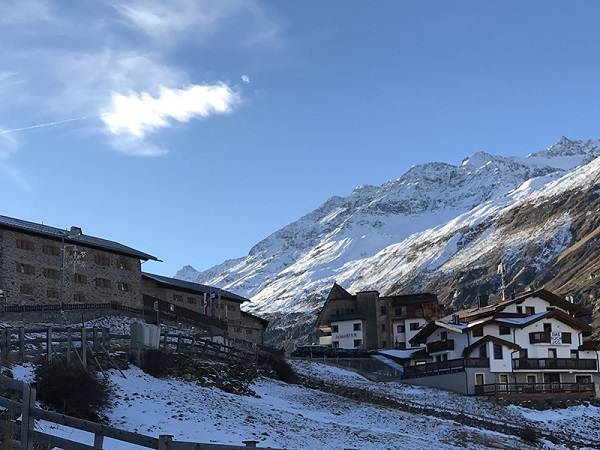
Photo 1: University Center in Obergurgl, Tyrol, Austria. The Conference "CSCs: Impact on Treatment"was held at the University Center with 55-year-old tradition of sport and science.
The first international conference on cancer stem cells (CSCs) was held in Obergurgl, Tyrol, Austria during December 7-11, 2016. This conference was organized by the Department of Therapeutic Radiology and Oncology (Medical University of Innsbruck) in cooperation with the Department of Otorhinolaryngology (Medical University of Innsbruck) and "Transferstelle Wissenschaft - Wirtschaft – Gesellschaft" (University of Innsbruck). Also, it was sponsored by Journal of Cancer Metastasis and Treatment (JCMT), and roll-up banners of JCMT were shown on the conference hall. Scientists from 18 countries representing experimental and clinical cancer research showed their recent data and participated in the discussions.
CSCs or tumor initiating cells are defined as a small subpopulation of carcinoma cells with specific molecular and physiological properties. CSCs can renew themselves giving more differentiated non-stem cancer cells comprising the tumor. Due to the CSC plasticity and aberrant differentiation capacities, CSCs and non-stem cancer cells can generate heterogeneous cancer cell subpopulations with different sensitivities to conventional therapeutic approaches. CSCs acquire specific molecular characteristics and properties that can be associated with tumor aggressiveness, treatment resistance and inclination for metastatic spread. Since it is generally accepted that CSCs initiate and sustain tumor growth, it is also suggested that cancer patient can be cured if all CSCs will be destroyed and eliminated by the applied therapeutic approaches.
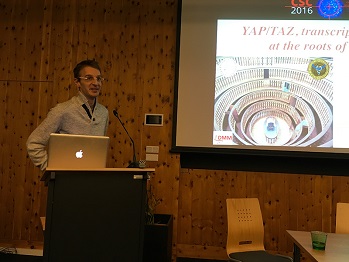
Photo 2: Dr. Luca Azzolin (Padova, Italy) was awarded with the prize for the best oral presentation. L. Azzolin has highlighted the role of YAP/TAZ in cancer initiation and progression.
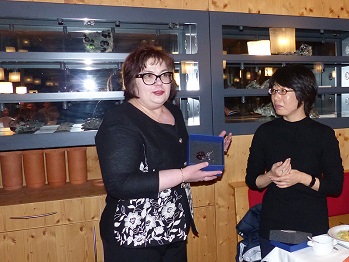
Photo 3: Dr. Mayumi Higashi (Kyoto, Japan) was awarded with the prize for the best poster presentation. The conference chair Ira-Ida Skvortsova is giving the poster prize to Dr. Higashi.
Conference "CSCs: Impact on Treatment" has been devoted to the problem of primary and acquired therapy resistance associated with disease progression and poor clinical outcome in cancer patients. This meeting contained pre-clinical and clinical sessions highlighting the role of CSCs in the treatment failure and molecular mechanisms associated with CSC aggressiveness and increased metastatic potential of CSCs. Thus, keynote lectures by Dean G. Tang (Buffalo, USA), Jürgen Dittmer (Halle/Saale, Germany), Anna Dubrovska (Dresden, Germany), Rob Coppes (Groningen, the Netherlands) and Maria Grazia Daidone (Milan, Italy) familiarized the conference participants with the new views on the problem of CSC identification and elimination using novel molecular-based strategies. Michael Weller (Zürich, Switzerland) and Nelleke Ottevanger (Nijmegen, the Netherlands) showed how oncologists can utilize the CSC concept in their daily clinical practice. Connie R. Jimenez (Amsterdam, the Netherlands) and Yong Li (Sydney, Australia) clearly demonstrated the capacities of the proteomic approach to uncover CSC biology, biomarkers and drug targets. In the oral and poster presentations, young and renowned scientists provided recent and novel insights in CSC capacities such as CSC differentiation/dedifferentiation, CSC quiescence, enhanced abilities for metastatic spread, and treatment resistance. Additionally, Luca Azzolin (Department of Molecular Medicine, University of Padova, Padova, Italy) and Mayumi Higashi (Kyoto Prefectural University of Medicine, Kyoto, Japan) were awarded for the best oral and poster presentations, respectively. All conference attendees earned 21 credit points of the Austrian Medical Council (DFP). Organizers are indebted to Dipl. Ing. Dr. Juliane Mayer, Mag. Claudia Platzer, and the team of the University Center in Obergurgl for excellent conference management and assistance in the organization of the social events. We are also very thankful for the financial support received from the Austrian Society for Radiation Oncology (OeGRO) and for the intellectual contribution from the European Society for Radiotherapy and Oncology (ESTRO; see the report by Prof. Rob Coppes in the ESTRO Newsletter December 2016, pp. 85-88: https://www.estro.org/binaries/content/assets/estro/about/newsletter/2017/161221-newsletter-january---february-2017_final-003.pdf) and European Organization for Research and Treatment of Cancer (EORTC). Organizers are heartily thankful and owe our deepest gratitude to Lisa Huang (Journal of Cancer Metastasis and Treatment) for her boundless readiness to help and assist during processing of the submitted abstracts and in the preparation of the conference book.
In 2018, the second conference on CSC research will be organized in Obergurgl, and scientists involved in CSC-related investigations are cordially invited to attend this meeting.
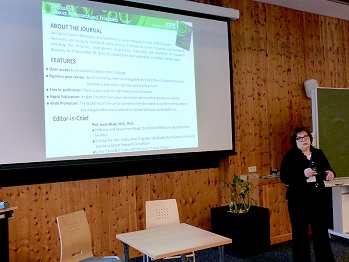
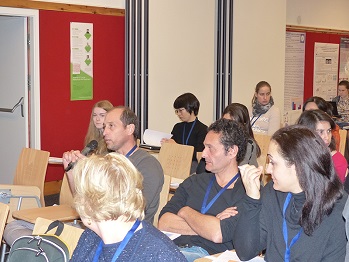
Photo 4 and 5: Prof. Dr. Ira-Ida Skvortsova, as the Editorial Board member of Journal of Cancer Metastasis and Treatment (JCMT), is introducing JCMT to all attenders in Conference "CSCs: Impact on Treatment".




